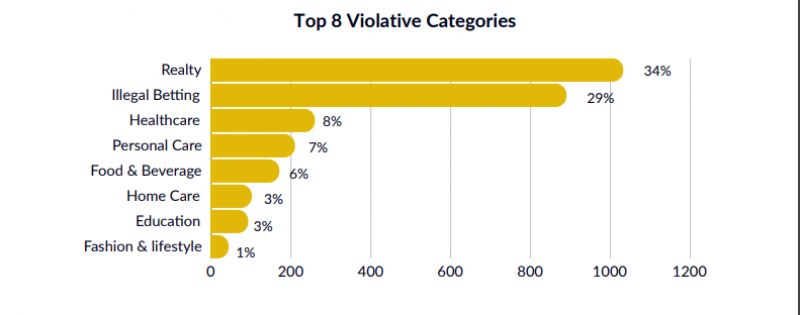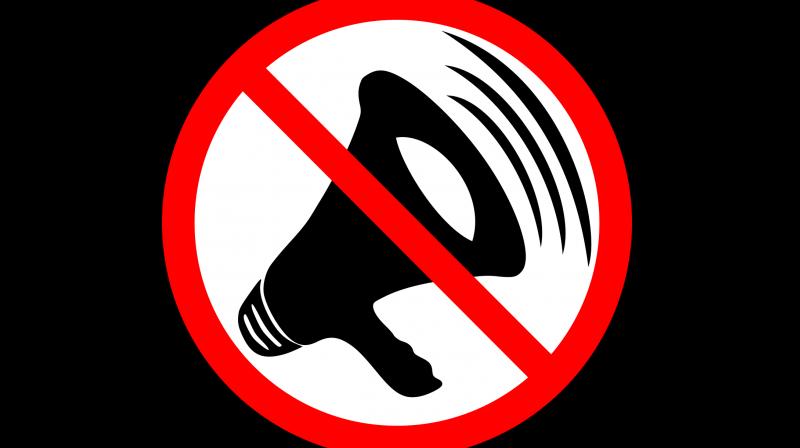The Advertising Standards Council of India (ASCI) has released its half-yearly complaints report for the period from April-September 2024. The report shows over 4,000 complaints reviewed for 3,000 plus ads, of which 2,087 digital ads were found to be in direct violation of the law.
Amongst these, 1,027 ads were found in violation of the MahaRERA Act (real estate), 890 were promoting illegal betting and gambling while 156 were in violation of the Drugs and Magic Remedies Act.
Of the overall advertisements processed, 98% of ads required modifications, of which 53% were not contested and promptly withdrawn or modified, according to the report.
A medium-wise split of the ads processed indicated that digital comprised the lion’s share with 93% ads belonging to the medium, while Television and Print ads comprised 3% each.
The top five violative sectors were real estate, illegal betting, healthcare, personal care, and food and beverages.
The report focuses on sectors with higher consumer impact such as real estate, restricted categories i.e. online illegal betting and advertising of products making green claims, among others.
Sector deep dive
Real Estate Sector: 1,027 ads were shortlisted from 2,115 ads screened in the real estate sector in Maharashtra for potential violations of regulatory requirements under the applicable MahaRERA Act. These ads were reviewed for compliance with mandatory disclosure norms, including the presence of registration numbers, QR codes, and other essential information. 99% of the ads shortlisted were found to be in violation of the MahaRERA Act.
ASCI received prompt compliance in 59% of the cases, where advertisers either modified their ads to include the missing information or withdrew them entirely to ensure alignment with regulatory standards. Non-compliant ads were flagged of to MahaRERA for further action. Taking action against the violative advertisers, MahaRERA penalised 628 real estate developers, imposing a penalty of Rs. 88.90 Lakhs, as per the report.
Illegal betting and gambling ads have proliferated digital media in new formats. In response, ASCI referred 890 such ads to the Ministry of Information and Broadcasting for further action. Among these, 831 Instagram posts displayed betting tickers, which directed viewers to offshore betting platforms. These tags and tickers appear on fan and community pages on Instagram, with some page owners reportedly earning daily amounts between INR 2,000 and INR 3,000 by featuring these logos. Additionally, 50 websites and social media pages were identified as promoting illegal betting apps and platforms, and nine influencer posts were found endorsing illegal betting services. This surge highlights the need for continued vigilance and regulatory action to curb illegal gambling promotions on digital platforms. Through MIB efforts, many of these pages have been taken down, as per the report.
Greenwashing claims in ads: ASCI reviewed 100 advertisements for potential violations of the ASCI Guidelines for making environmental/green claims versus 34 ads in the previous year (YR23-24). Notably, 99% of these ads were identified through ASCI's proactive monitoring, with 100% ads requiring modifications due to a lack of transparency. Majority of the violative ads were from the Home Care sector, where products claimed to be eco-friendly/ environment friendly, without adequate support data. 47% of the ads processed were not contested. These are instances where advertisers acknowledge the error made in the ad and promptly modify it or take it down. 28% of these cases were reported to the Government for non-compliance with ASCI Code and Guidelines, as these are also in potential violation of the recently launched Guidelines for Prevention and Regulation of Greenwashing by The Central Consumer Protection Authority (CCPA), according to the report.













